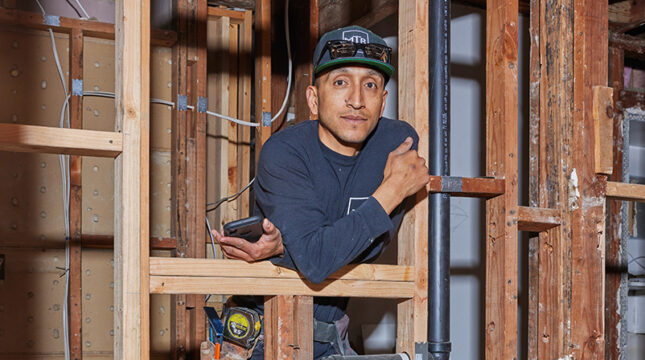How to get a general contractor license in Nevada
According to the Nevada Administrative Code, there are three main classification categories for contractors:
- Classification A: This classification covers general engineering and any projects with “fixed works” requiring specialized engineering knowledge and skills. Subclassifications are available for various work projects, including bridges, highways, residential pools, industrial piping and more.
- Classification B: This classification covers general building — primarily the construction and remodeling of buildings. Subclassifications are available for specific areas like commercial remodeling, pre-manufactured housing and prefabricated steel structures.
- Classification C: This classification covers many specialty contracting categories, including: plumbing and heating; electrical; carpentry, maintenance and minor repairs; masonry; and roofing and siding.
In total, there are 36 specialty classifications and several subclassifications for the type of contracting work being done. There is also an AB classification for those who plan to work under the general engineering and general building categories.
The type of classification you select for your Nevada general contractor’s license will affect what exams you need to take and your bond amount (more on that below).
To become a licensed contractor in Nevada:
- Register your business at SilverFlume, Nevada’s business portal.
- Apply for a license with the Nevada State Contractors Board.
- Pass the contractor trade and management exams.
- Get contractor business insurance and fulfill the state’s bond requirements.
The following sections will cover each of these steps in more detail and provide important information you’ll need to get a Nevada general contractor’s license.
Who needs a Nevada general contractor license?
The Nevada State Contractors Board requires “all businesses or individuals who construct or alter any building, highway, road, parking facility, railroad, excavation, or other structure” to have a license if they work on projects over $1,000. This includes subcontractors and specialty contractors.
Getting a license is essential if you’re a contractor in this state. If you’re found working without a contractor’s license in Nevada, you can be charged with a crime punishable by fines and jail time.
Insurance requirements for Nevada general contractors
Nevada requires contractors to get insurance coverage for workplace injuries. Additional business insurance is not required, but some general contractors choose more coverage to help protect their businesses.
Required insurance for Nevada contractors
If you have one or more employees, you’re required to get workers’ compensation insurance. Your insurance must cover your direct crew as well as any subcontractors, independent contractors and their employees that you work with. If you don’t have any employees and don’t plan to work with subcontractors, you can apply for an exemption from this insurance requirement.
Sometimes referred to as industrial insurance, workers’ comp insurance can help cover expenses related to workplace injuries. Because of the nature of contracting work, this is especially important coverage for protecting workers who get hurt on the job and employers who could otherwise suffer significant financial losses.
You must provide proof of worker’s comp coverage (or an affidavit of exemption) to the Nevada State Contractors Board to get a license. You’ll need to maintain this insurance policy to renew your license. Check with your local jurisdiction to find out how much coverage you need for your business.
Other insurance options for Nevada contractors
General liability insurance can help provide financial protection for your business if you are held responsible for harm caused by common accidents, like damage to someone’s property or a client injury.
In addition to general liability insurance, the following types of insurance may be useful for contracting businesses:
- Errors and omissions insurance: Also known as professional liability insurance, this type of policy can help with financial protection if someone accuses you of making a professional mistake.
- Commercial auto insurance: Do you own work vehicles titled to your contracting business or use a personal vehicle for work? If so, commercial auto insurance can help cover accident-related expenses like property damage and medical bills.
- Tools and equipment insurance: This can help cover the repair and replacement costs for your gear if it’s damaged or stolen.
- Commercial property insurance: If you own or rent physical space for your business, this coverage can help provide financial coverage if your equipment, inventory or the building itself is damaged.
Nevada general contractor license requirements
Once you know which license classification you need, you can apply to the Nevada State Contractors Board. Your application must contain the following:
1. Business ID number
You’ll need a Nevada Business ID number issued by the Secretary of State to apply for a contractor’s license. If you don’t already have a business ID number, you can get one at SilverFlume, Nevada’s business portal. You can register as an LLC, LLP, corporation or sole proprietor.
2. Financial statement
You’ll also need to submit a financial statement based on which monetary limit you are requesting. The monetary limit is the maximum contract you can take on for a single client. Contractors can fall into one of the following categories based on the limit they request on their application:
- $10,000 or less
- More than $10,000, but less than $50,000
- $50,000 or more, but less than $250,000
- $250,000 or more
3. Background disclosure statement and authorization form
The state requires applicants to undergo a background check and fingerprinting. You’ll need to submit this form consenting to this with your application.
4. Experience qualifications
Nevada requires all applicants to fulfill two “qualified individual” categories:
- Management Qualified Individual: This person should be fit to oversee the day-to-day transactions of the business.
- Trade Qualified Individual: This is the person who will perform the actual contracting work for the business. They need to show at least four years of work experience as a journeyman, foreman, supervising employee or contractor in the specific trade category noted on the application.
One applicant is permitted to fulfill both of these roles, or you can apply with one person as the Management Qualified Individual and one as the Trade Qualified Individual.
Nevada general contractor exams and fees
After you file your Nevada State Contractors Board license application, you’ll receive a letter detailing your exam eligibility.
There are two examination requirements for Nevada contractor licenses:
- A general business and law examination, also known as a “CMS” exam, which the Management Qualified Individual takes.
- A trade-specific examination, which is based on the classification of license you’re applying for. The Trade Qualified Individual takes this exam.
PSI Services administers these exams. They provide content outlines and other information to help applicants prepare for tests.
Nevada contractor exams cost $140 if you schedule them together or $95 each if you schedule them separately. Testing is administered in the Las Vegas, Reno and Elko areas.
You must pay a non-refundable application fee of $300. Upon approval, you’ll pay $600 for a two-year license (one-year licenses are not available).
While not a fee, residential contractors are also required to contribute to a Residential Recovery Fund for the state of Nevada. This fund reimburses homeowners when a licensed contractor fails to complete their contract appropriately. Costs range from $200-$1,000, depending on the monetary limit you select for your business.
As a contractor in Nevada, you’ll need to renew your license every two years.
The Nevada State Contractors Board allows contractors to renew their licenses online. Simply make an account using the registration ID provided on the renewal form you receive from the Board. The renewal fee every two years is $600.
Some programs can expedite licensing applications for members of the military, military spouses and veterans. To participate, you’ll need to submit additional documents with your application.
Nevada general contractor license reciprocity
The state of Nevada does not recognize general contractor licenses from other states. However, you may be exempt from some examination requirements if you have a valid contractor license from another state.
To be considered for Nevada contractor’s license reciprocity, you must meet the following requirements:
- Pass an equivalent trade examination in one of the participating states. (See State Equivalency Chart for exemption eligibility.)
- Hold an active license in the endorsing state for the past four years.
- Submit a completed out-of-state license verification form with your application.
If you are approved for licensure by endorsement, you will still need to pass the general business and law examination before your contractor’s license can be issued.
Bond requirements for NV general contractors
The Nevada State Contractors Board requires all licensed contractors to secure a bond for their business. The amount of this bond, which can range from $1,000-$500,000, will be determined when your license is approved. Factors that affect the required bond amount for each contractor include:
- The license classification you receive
- The monetary limit you provide in your application’s financial statement
- Past, present and future financial responsibilities
- Your experience and character
Before the state issues your Nevada contractor’s license, you’ll need to submit one of the following:
- A surety bond from a surety company authorized to do business in Nevada and has a rating of “A” or better for long-term obligations.
- A cash bond in the form of a cashier’s check made payable to the Nevada State Contractors Board. (If you choose a cash bond, you’ll also have to pay a biennial administrative fee of $200.)
Failure to produce a bond will lead to the denial of your license application. If you don’t maintain your bond, the Nevada State Contractors Board may suspend, revoke or refuse to renew your license.
Swimming pool contractors may also have to submit a consumer protection bond ranging from $10,000 to $400,000.
How NEXT helps support Nevada general contractors
NEXT helps you get the right general contractor insurance to satisfy Nevada licensing requirements and protect your business.
We make it easy to apply for coverage and get a certificate of insurance in under 10 minutes on desktop or mobile.
We only sell small business insurance, specializing in coverage for construction professionals. We’ve helped thousands of contractors get affordable insurance packages customized to meet their unique needs.
Get an instant quote with NEXT today.






